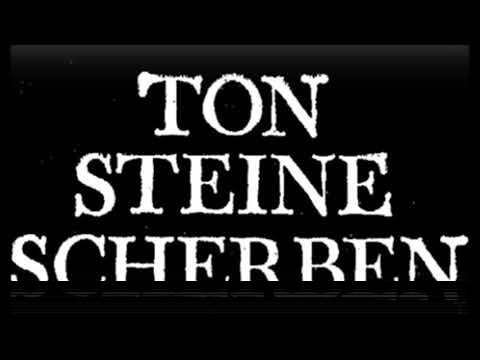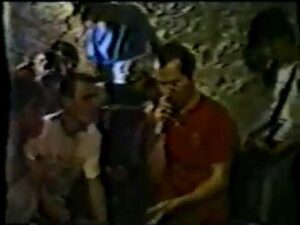Formation & Members
Ton Steine Scherben, often referred to simply as “Die Scherben,” was a pioneering punk band that emerged from the politically charged atmosphere of West Berlin in 1970. The band was founded by Rio Reiser (real name Ralph Möbius), a charismatic and influential figure who served as the band’s lead vocalist and primary songwriter. Alongside him were R.P.S. Lanrue (Ralph Peter Steitz) on guitar, Kai Sichtermann on bass, and Wolfgang Seidel on drums. Over the years, the lineup saw various changes, but the core members remained committed to their revolutionary ethos and raw musical style.
Their name, Ton Steine Scherben, which translates to “Clay Stones Shards,” symbolizes the band’s connection to the grassroots cultural movement and their intent to shatter societal norms. The members were deeply involved in the politically charged squatter scene, a connection that heavily influenced their music and lyrics.
Musical Style & Characteristics
Ton Steine Scherben’s music is characterized by its raw, unpolished sound, which melds punk rock’s aggressive energy with elements of rock, folk, and blues. Their lyrics, often penned by Reiser, are known for their directness and socio-political commentary, tackling topics like oppression, freedom, and the struggles of the working class. The band stood out for their commitment to singing in German at a time when English dominated the music scene, making their music accessible and relatable to their local audience.
Their songs frequently featured anthemic choruses, catchy guitar riffs, and a sense of urgency that captured the spirit of rebellion. This blend of musical and lyrical prowess made them a voice for the disenfranchised and a beacon for those seeking change.
Key Works & Discography
Ton Steine Scherben’s discography is a testament to their influence and innovation in the German punk scene. Their debut album, “Warum geht es mir so dreckig?” (“Why Do I Feel So Bad?”) released in 1971, set the tone with its gritty sound and provocative lyrics. Tracks like “Macht kaputt, was euch kaputt macht” (“Destroy What Destroys You”) became anthems for the youth protest movements.
Their second album, “Keine Macht für Niemand” (“No Power for Nobody”), released in 1972, solidified their position as a voice of dissent. It included tracks like “Mein Name ist Mensch” (“My Name is Human”), which emphasized human dignity over systemic oppression. Over the next decade, they released several albums, including “Wenn die Nacht am tiefsten…” (“When the Night is Deepest…”) in 1975 and “IV” in 1981, each exploring different facets of their political and musical identity.
Influence on Other Bands/Scenes
Ton Steine Scherben’s impact on the music scene extended far beyond their immediate circle. They became a crucial influence on the burgeoning German punk and new wave scenes of the late 1970s and early 1980s. Bands like Die Toten Hosen and Die Ärzte have cited Die Scherben as a formative influence, both musically and ideologically.
Moreover, their commitment to addressing social and political issues inspired a generation of musicians and activists. The band’s DIY ethic and their refusal to conform to commercial pressures set a precedent for many subsequent independent bands in Germany and beyond, reinforcing the idea that music could be a powerful tool for social change.
Breakups or Reunions
Ton Steine Scherben faced numerous challenges throughout their career, including financial difficulties and internal tensions. These issues eventually led to their disbandment in 1985, following the release of their live album “Scherben.” Despite their breakup, the band members remained influential figures in the music scene.
In the years following their dissolution, there were sporadic reunions and tribute concerts, often centered around the enduring legacy of Rio Reiser, who passed away in 1996. These events have kept the spirit of Die Scherben alive, with former members occasionally collaborating on new projects or performances that pay homage to their storied past.
Current Reputation & Legacy
Today, Ton Steine Scherben is regarded as one of the most influential bands in German music history. Their fearless approach to music and politics continues to resonate with listeners, and their albums are considered classics within the punk genre. The band’s legacy is preserved through numerous reissues of their work, documentaries, and biographies that explore their impact on both music and society.
Their ability to address complex social issues through music has ensured that their message remains relevant, especially in contemporary times marked by social and political upheaval. Die Scherben’s influence is evident not only in music but also in the broader cultural landscape, where their ethos of resistance and authenticity continues to inspire new generations.
Conclusion
Ton Steine Scherben’s story is one of defiance, creativity, and enduring influence. As pioneers of the German punk scene, they used music as a vehicle for social change, challenging the status quo and empowering the disenfranchised. Their legacy is not only preserved in their powerful discography but also in the countless musicians and activists who have drawn inspiration from their work.
In a world where music often serves as a mirror to society, Ton Steine Scherben remains a shining example of how art can confront, inspire, and ultimately transform. Their journey from the streets of West Berlin to the annals of music history is a testament to the power of punk and the enduring spirit of rebellion.









